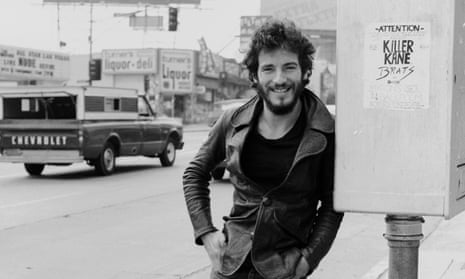When Bruce Springsteen first played London in November 1975, he was so angered by the hype surrounding the show – “FINALLY! London is ready for Bruce Springsteen” – that he stormed around the Hammersmith Odeon destroying posters and flyers. “My business is SHOW business not TELLING. You show people and let them decide,” he rails in this compelling and often painfully candid autobiography. The night’s performance – as ever, a barnstormer – sealed his reputation in a country he revered, “the isle of our heroes”.
Springsteen’s epic live shows, habitually three to four hours long, are part of his legend, his triumph. Why he submits to them, even now as a sixtysomething, is a mystery explained in Born to Run. There is the joy of performance – “life-giving, muscle-aching, mind-clearing, cathartic pleasure and privilege” – and a work ethic inherited from his blue-collar New Jersey upbringing.
Then comes the revelation of a deeper propellant, a profound unease that began in childhood – Bruce was nicknamed “Blinky” in primary school on account of his fluttering eyelids – and erupted into full-blown depression in his 30s, on the eve of 1984’s Born in the USA, the album that brought him global stardom. “My depression was spewing like an oil spill over the beautiful turquoise green gulf of my carefully planned existence,” recalls Bruce. In despair he called his manager, Jon Landau, who knew something of the problem and who told him bluntly: “You need professional help.”
So began a lifetime of counselling and medication for a condition – one notes the recurring imagery of “darkness” in Springsteen’s prolific output – whose sure-fire cure has always been the dazzling stagecraft of heroic guitar poses, dramatic knee skids, athletic piano leaps and air-punching exuberance. “Exposed in front of thousands, I have always felt perfectly safe,” he says. “That’s why you can’t get rid of me.”
Who knew? Certainly few of the millions for whom Springsteen has been a joyous, affirmative force, a man not without his moody, reflective moments, for sure, but to most eyes a model of dignity, whose songs empathised with the marginalised and the oppressed, and who defiantly sang: “I believe in the promised land”.
Depression was in the family, not in the exuberant Italian lineage of his mother, but plain enough in his dour, heavy-drinking Irish father, with whom the young Bruce had a troubled, warring relationship to which he returns repeatedly here, admitting that “I was always in the market for a surrogate and appreciative daddy”, a role that would be fulfilled by assorted friends and managers. There is a lot of self-knowledge on display here, and acknowledgment of the help and love he has received from fellow travellers and, most of all, from his second wife, singer Patti Scialfa, with whom Springsteen has three children.
“The Boss”, as Springsteen is known – a name he dislikes and conspicuously absent here – has never shied away from interviews, and his 18 studio albums have been endlessly analysed and the inspirations for their songs located in a plethora of biographies. Born to Run adds little that’s new, but its narrative voice proves insightful. Springsteen’s high school years were spent forming bands such as the Castiles that negotiated a tricky path between competing teenage cliques – the pompadour and sharkskin-sporting “grease” and the cheerleading, college-bound “rahs” who populated the segregated New Jersey shoreline. The “small-town Caesars” and “greaser girls with dive-bomber bras” would show up later on Springsteen’s early albums.
First, though, came a rugged apprenticeship with Steel Mill, a Zeppelin-style heavy rock band formed by an 18-year-old Springsteen once his parents had departed for a new life in California. Left to fend for himself, Springsteen became a “faux hippy”, living in the concrete storeroom of a surfboard factory, too much of a control freak to do drugs or drink (“Music was going to get me as high as I needed to go”).
Later, he would learn to live “high on the hog”, but the belief in graft and self-control has never vanished; “work” is one of the most favoured words in his book. By his own admission no musical revolutionary, Springsteen worked at his craft, winning a contract with Columbia Records as a singer-songwriter, to be hailed as first “the new Dylan” (one of several) and then, in a review by his future manager, Jon Landau, as “rock and roll’s future”. Springsteen is droll about this accolade but, as he came to see it, “if somebody had to be the future, why not me?”
By the standards of most rock star autobiographies, Born to Run is neither sensational nor self-serving (you can forgive Bruce for dropping that Jack Nicholson called him “king of New Jersey” at Sinatra’s funeral), with plenty of self-deprecatory digs and way fewer cars than in the songs. Springsteen has delivered his story with quiet dignity. Give thanks that we can’t get rid of him.
Born to Run is published by Simon & Schuster (£20). Click here to buy it for £16.40








Comments (…)
Sign in or create your Guardian account to join the discussion